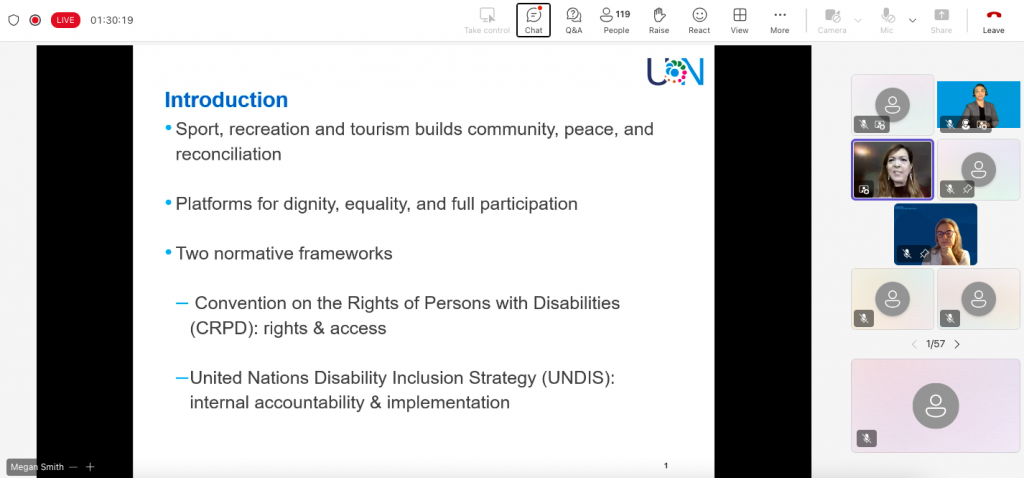November 6, 2025
Sport has the power to unite people across borders, cultures, and abilities. On November 6, United Through Sports joined the United Nations for the online event “Promoting Accessibility and Inclusion as a Core Principle of Sporting Events Security Culture.” The session brought together leading experts, policymakers, and representatives from across the globe to explore how inclusion and accessibility can shape the future of major sporting events. It was a powerful reminder that sport is not only about competition it is about connection, equality, and ensuring that every individual can participate safely and with dignity.
The event opened with a reminder of why such conversations matter. Major sporting events have the unique power to connect communities and cultures, creating shared experiences that transcend boundaries. Yet, they also come with a responsibility to ensure that every person, regardless of ability, can participate safely, fully, and with respect. Accessibility and inclusion, the speakers emphasised, are not optional enhancements; they are fundamental human rights.
The session featured three speakers who examined how global frameworks, partnerships, and practical measures can advance accountability for accessibility and inclusion in sport. Discussions centred on the importance of embedding inclusion into every stage of event planning and delivery, from infrastructure and security operations to legacy outcomes that shape how societies view disability.
The first speaker, Megan Smith, Social Affairs Officer in the Executive Office of the Secretary General, opened the session by discussing how international frameworks can turn commitments to accessibility and inclusion into real, measurable change. Drawing on extensive experience working with organisations of persons with disabilities and UN agencies, Megan highlighted the importance of the Convention on the Rights of Persons with Disabilities as a foundation for policy and practice. The presentation explored how the United Nations incorporates accessibility protocols and inclusive urban planning into its strategies, ensuring that inclusion is considered from the very beginning of every initiative. Megan also reflected on the need for stronger accountability mechanisms, emphasising that accessibility cannot remain an aspiration; it must become a consistent standard, supported by collaboration, clear strategy, and long term commitment.

The second speaker, Denis Pavlović, Senior Manager of Paralympic Games Operations, brought over two decades of experience in managing global sporting events. Having held key leadership roles across both the Olympic and Paralympic Games, Denis shared the powerful impact of the Paralympic movement in reshaping perceptions of disability. With more than 4,000 athletes from 170 countries participating in Paris 2024, he noted how the Games serve as a catalyst for societal change. Through visibility and representation, para-athletes challenge stereotypes and inspire inclusion. Denis also highlighted the significant investments made by the city of Paris over €125 million, to improve accessibility in public infrastructure, crossings, and facilities creating a lasting legacy for residents and visitors with disabilities alike. He further spoke about the importance of security and operational considerations for athletes and spectators with disabilities, emphasising the need for proper systems, facilities, and awareness training to ensure that everyone can participate safely and comfortably. Disability awareness training for security personnel, he noted, is vital in creating an environment rooted in safety, dignity, and respect for all participants.

The final speaker, Paulo Gomes, Secretary of the Saint-Denis Convention at the Council of Europe, shared insights from his role overseeing this legally binding international instrument. Having worked closely with the United Nations for over three decades, Paulo discussed the Convention’s three key pillars: safety, security, and service, and its emphasis on multiagency cooperation and inclusiveness under the pillar of service. He outlined several initiatives developed under the Convention, including accessibility audits, staff training, regional forums, and awareness campaigns aimed at strengthening inclusion in the context of large scale events.
The discussions throughout the session were deeply relevant to real world progress. Accessibility and inclusion are central to building equitable societies and ensuring that sport remains a true platform for empowerment. The examples shared reflected the legacy of the Paris 2024 Paralympic Games and the implementation of inclusive urban planning, show how inclusive policies can transform communities and redefine how the world experiences sport. These frameworks provide governments, event organisers, and civil society with practical guidance to uphold dignity, equality, and opportunity in every aspect of sporting culture.
For United Through Sports, events like this serve as powerful reminders of why continuous learning and collaboration are essential. As an organisation dedicated to promoting inclusion and equal opportunity through sport, UTS values the insights gained from global dialogues such as these. They inspire our mission to ensure that every young person, regardless of ability, background, or circumstance, can experience the unifying power of sport. Engaging in these conversations strengthens our collective resolve to build a more inclusive, accessible, and united sporting world.

